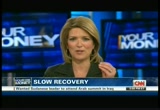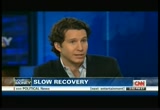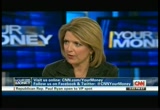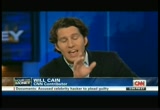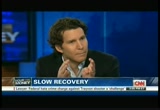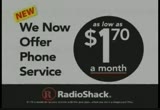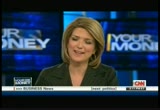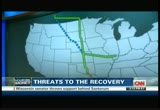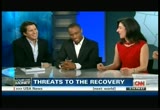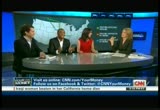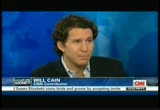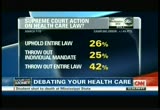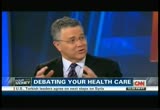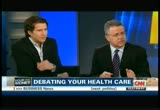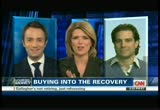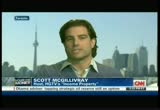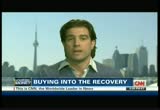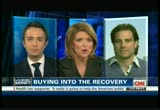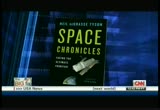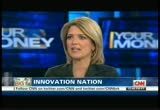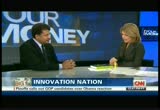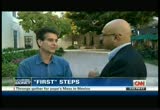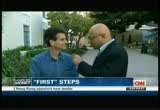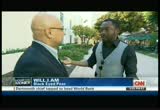tv Your Money CNN March 25, 2012 3:00pm-4:00pm EDT
3:00 pm
from a land of opportunity to a land of confusion. the numbers say an economic recovery is underway in america, so why do so many feel left behind? i'm christine romans. welcome to "your $$$$$." ali velshi is off today. three strong signs that a recovery is indeed taking hold. stocks have been soaring with the dow hitting levels not seen in nearly four years. hiring is picking up as employers have added more than 200,000 jobs per month for three straight months. even the housing market leaving a little bit of room for optimism with sales of existing homes up 8.8% in february compared one year earlier. will kaine is a cnn contributor, mark lamont hill is an associate
3:01 pm
professor at columbia university. we'll see what we can get with those two, but i want to start with donronna. you asked people to honk if you felt the recovery. the signs are there, but people aren't honking. >> you don't hear anything in the streets. no honking. we are in recovery and we've been in recovery for two years. which says sympathetic. a lot of us aren't feeling it. the numbers are there, as you mentioned. but this is a bifurcated recovery. the fact that stocks are up kind of speaks to that. people who own stocks tend to be wealthy. there's a lot of jobs at the top, a lot of fast-growing jobs at the bottom, but there aren't enough in the middle. we've got a two-speed recovery. >> and if people are feeling this recovery, people without money aren't. i think that's something we can all agree on. >> absolutely. >> let's talk about mitt romney, the front-runner for the gop presidential nomination. he acknowledges that a recovery is underway, but he says he
3:02 pm
would be doing a lot better if he was in charge. >> i'm someone experienced in the economy. i'm not an economic lightweight. president obama is. we're not going to be successful in replacing an economic lightweight with another economic lightweight. we're going to have to replace him with someone who knows this economy. >> will, he's making the the case that he's the guy to help the recovery. and if there's a recovery underway, he's got to be the guy to say, midst an economic recovery, i'm the guy to really know how to make it better. >> it's interesting. you've seen a shift in the message, because you have to recognize the reality. we're starting to see economic indicators, as you just listed, point northward, point up. his message has shifted to, look, we could have done better. somebody like me could have performed better in this recovery, and he points largely now to the 1981 reagan recession which was shorter, more robust and says, if you have somebody like me in charge, i can make this better. whether or not that's a fair
3:03 pm
comparison is up for debate. i'm going to tell you that's his argument and the one he'll try to sell politically. >> he's changed the the tone a little bit, this week he had a great line, his supporters say it's a great line where he says, look, we live in a country where we built the hoover dam and the interstate, you know, highway system and this president can't even build a little pipeline. he's trying to say that if things get better, mark, that he's the guy who can really leverage it. but the president has to be very careful about crowing about an economic recovery that rana just pointed out that a lot of people aren't feeling. >> the republican mantra since the beginning has been that the economy is broken, president obama is responsible. he has no idea how to fix it, and all things are pointing downward, unless he gets out of office. and because the indicators are pointing upward and everything is much better than they were, he has to celebrate that. in fact, the obama administration has done a terrible job of celebrating its successes. at the same time, he can't flaunt that as people still don't have to work, as people
3:04 pm
still don't have living wages. he has to strike that balance and i think he's doing a decent job. >> i think jobs are a really important part of this scenario. we know that this week, you said jobless claims, the lowest they've been in four years, meaning there are fewer people headed to the unemployment line. say these things on television and i get hate mail for people who say, my brother can't get a job. he's been out of work for 14 months. don't overstate the strength in the labor market, because a lot of people are coming back and getting jobs for much less pay than they used to. what happened in the 80s versus the '90s versus now. here's an important fact. every recovery since 1990 has been weaker and taken longer than the last one, and this is the weakest and longest recovery in history. there are just a lot of people out there that they're either not coming back into work, or when they do, they're having jobs that are a lot less than what they settled for. >> i agree with you 100%. it's a statistical fact that rana just laid out that every
3:05 pm
recession's been longer and more painful starting in about the 70s when we had this the technological and industrial shift in the united states. you want a fair criticism of how obama's handled this recovery, you could make the argument that he got distracted by health care reform, by considering cap and trade, and he talked about things that had nothing to do with the recovery, thus prolonging it. >> i don't think they're competing agendas. it may have the political perception that he's distracted, but i think he can walk and chew gum at the same time. >> but it's whether or not the massive business sector across this country, not knowing what their future taxes will be, not knewing wh inin ining what thei regulatory scheme will be. >> i don't think it's about taxes. warren buffett, one of the greatest investors in the country, if not the world, would say there was more investment in the '50s, but i think it's about investment and education. that's what will actually enable us to compete globally. that's what we've got to do to
3:06 pm
get back to the growth we had in the '50s. >> i want to be clear about something. i didn't make an argument about taxes whether they're higher or lower. in 2009, when you're faced with a massive recession, the uncertainty that was injected into a massive economy, the largest economy in the world that you're going to restructure 20% of it, health care, and possibly more with cap and trade, injects a massive amount of uncertainty into what you hope will be a recovering economy. >> first of all, the mass anxiety that the wealthy and uber rich seem to have, they have that when there's a proposed bill or a proposed tax hike. >> not just the wealthy, but businesses. >> well, the mass anxiety at that time was not buff health care reform, even though many people didn't like it, it was because their business went off a cliff. and i think one of the real problems is that this administration and a lot of people underestimated how hard it was going to be to get out of this mess. and at the same time, was pushing, you know, the president's single legislative agenda, which will vastly remake the health care system. >> 20% of the american economy, that's what health care is. and you want to put energy on
3:07 pm
top of that, cap and trade -- >> i haven't heard the words cap and trade in a long time. >> you did in 2009. >> but cap and trade wasn't on top of the legislative agenda. it was very quickly pushed off the table. blue dog democrats pushed it off the table. >> they had three things they wanted to focus on. they figured of very quickly they could only do two. stimulus, health care, and cap and trade, cap and trade lost. >> it was not a top agenda item. sting that quickly ended the conversation. >> i'll jump. in and just say, on health care, because i think it is something worth bringing up, it was a huge issue. it was a huge thing to bite off. you could make the argument that you just made, but i think that it wouldn't have mattered, because ultimately, president obama did try to get through infrastructure change. he tried to make investment there. tried to make investment in education, which any company will tell you p. i mean, i'm out talking to companies all the time, they'll say, we've got three our four jobs open that they can't fill because they don't have the
3:08 pm
skilled workers. >> america's debt, europe's debt, or just that nauseous feeling you get every time you go to fill up your car with gas, the biggest threats to the economy next on "your $$$$$." [ male announcer ] what if we told you that cadillac borrowed technology from ferrari to develop its suspension system? or what if we told you that ferrari borrowed technology from cadillac to develop its suspension system? magnetic ride control -- pioneered by cadillac, perfected in the 556-horsepower cts-v. we don't just make luxury cars. we make cadillacs.
3:09 pm
top quality lobster is all we catch. [ male announcer ] don't miss red lobster's lobsterfest. the only time of year you can savor 12 exciting lobster entrees, like lobster lover's dream i'm laura mclennan and i sea food differently. [ speaking in japanese ] yeah, do you have anything for a headache... like excedrin, ohhh, bayer aspirin... ohh, no no no. i'm not having a heart attack, it's my head. no, bayer advanced aspirin, this is made for pain. [ male announcer ] bayer advanced aspirin has microparticles, enters the bloodstream fast, and safely rushes extra strength relief to the sight of your tough pain. feel better? yeah...thanks for the tip! [ male announcer ] for fast powerful pain relief, use bayer advanced aspirin.
3:11 pm
gas prices are up nearly 20% this year. the national average creeping close to that $4 a gallon mark. everybody wants to know why gas prices are rising so rapidly and president obama says he has the answer. >> every time there's tensions that rise in the middle east, which is what's happening right now, so will the price of gas. the main reason the gas prices are high right now is because people are worried about what's happening with iran. it doesn't have to do with domestic oil production. it has to do with the oil markets looking and saying, you know what, if something happens, there could be trouble, so we're going to price oil higher just in case.
3:12 pm
>> as gas prices keep rising, the republicans keep blaming the president. would gas prices be lower if a republican was in office? >> no. in fact, you can make an argument they would be worse. can you make an argument republicans would take a more hawkish stance against iran, more fear and speculation on global prices. making them hire higher. that is fair and true. >> i agree. what i don't agree with you, i don't think there's a more hawkish policy on foreign policy than obama's taking. but i do think you're right, this has nothing to do with what we do here domestically, which is why i get so frustrated when people on the right and sometimes on the left start advocating for mass drilling, mass domestic oil production, ramping it up, because it won't change anything. gas prices will still be the same. >> now you went way too far. >> i'm surprised you guys agreed in the first place. but i think you're right. the fact is that gas is high because oil's high. oil is high not just because of tensions in the middle east, but -- >> demand, demand.
3:13 pm
>> demand in china. >> we don't move the needle anymore. it's about china and brazil. >> it's about the rest of the world that's growing like gangbusters anymore. >> and there's nothing we can do about it. >> there's not a lot we can do about it. we're actually more energy independent than we've been in a long while. we're exporting more petroleum products this year than we have since 1949. >> when people make the argument we're part of a global oil market and what we drill locally won't have that big an effect on price, they carry the argument too far. >> but it does sometimes. if we can put up the keystone map, you talk about blockages in the midwest, but you're having increased production in the midwest. >> it's not just increased production, this is a revolution. the state of north dakota has just moved to the second largest oil producing state. >> down in the bottom part, the orange line, that is the keystone pipeline extension that the president has fastracked, or as you heard this week, has fast tracked. the blue part is the part that crosses the border -- i almost
3:14 pm
said with china, with canada. and that part goes through the nebraska sand hills and there's some environmental concerns there, but the president didn't fast track it. they're already starting to build it down there. he really doesn't have the approval to fast track it. but i think this administration wants this pipeline, but they've got to be very careful about how it's done. >> this is the fair criticism of the obama administration. over the long-term, they have put in place hurdles, made it hard for domestic oil production to move forward. federal -- drilling on federal lands off the continental shelf or on bmn land is down, not improving the continental pipeline, this is important to our long-term future. >> you know what's more to our long-term energy future is green technology. if you look over the last 100 years, there's been a lot of oil price spikes, but every time there's been some new technology, some new shift, be it from oil to gas or coal to oil, now we need to make the shift from oil to green technologies. and the more we can push that, the faster prices -- >> i know, how about we have the department of energy give a
3:15 pm
blank check to a bunch of solar companies? >> i'm not saying that. i'm saying have a lot smarter, like china, like denmark, like germany, have a lot smarter private/public partnerships with companies and universities. >> and you can make smart investments. he's shaking his head -- >> evenings we're teaming up on him. >> you want to talk about having a smarter energy future. we have the energy future of the past that's pulled more people out of poverty, warmed more homes and put more people on the roads than any energy source in the history of mankind. but you suggest you know what tomorrow's is. i'm going to stick with the one that's working. >> the thing i will say, the big buffett buy of burlington northern santa fe, you look at how much -- i was just in nebraska a couple years ago, and the amount of coal that's coming out of those -- they're making a bet on we're going to be burning this stuff, stuff like oil and coal for 200 more years. >> nobody saying that fossil fuels are going away, but what i'm saying is we have access to about 12% of the entire world's
3:16 pm
fossil fuels. the rest is in the hands of state-owned companies. >> let me ask this question, though. people think that they have, in this country, have some kind of a right to very low gas prices. do you have a right in this country to low gas prices? gas prices go up, people go crazy, will. >> no, you don't have a right to low gas prices. i don't know how to say it, but, no. >> it's not a natural right. >> you don't have a right to anything. >> but gas prices go up and it becomes more important than any poll out there, it becomes, blame the president, blame the republicans, blame congress. >> i don't think it's about having a right. but i think what it is, the american people have been duped into thinking that this is something that is manageable or something that can be changed. so it's not that people think it's a right, they just think it can be fixed. >> how long in the future until the future will be you be arguing that gas is a price. we're basically arguing that health care and housing is a right, why not gas? >> we've been talking about this fragile recovery. i want to talk about maybe some of the biggest risks. we're talking about gas prices, but are gas prices the biggest risks to the rory or is it
3:17 pm
european debt, american debt? >> you are european debt. >> you don't see a big euro sign over the pump every day when you go to fill your car, which is why we think so much about gas, but europe could still blow up. the solutions have been pieceme piecemeal. if that happens, we could find ourselves in another slowdown. >> we're going to leave it there. thanks, guys. wait, does the recovery last? do we all think the recovery lasts? >> of course. the recovery will last, things will be great, jobs will be created. >> i'm the one who will tell you the right answer is, i don't know. >> we can keep that right underneath will's name, will, i don't know. will stays, rana, thanks so much, mark lamont hill. the health care debate goes before the supreme court this coming week. this is an issue that affects every single one of you watching right now. how will it all shake out? next on "your $$$$$." safe driver discount. chipmunk family reunion. someone stole the nuts.
3:20 pm
3:21 pm
supreme court. six hours have been set aside to hearing arguments. one cases get just one. will cain is back with us, jeffrey toobin is authority on all things supreme court. the central issue in this case is the mandate stating americans must buy health insurance or face financial penalties. if that's ruled unconstitutional, what happens? is the entire law dead? >> that's up to the supreme court. of the judges that have declared the the law unconstitutional, and there have been a hand full of them, most of them, except for one, have said only the man date is unconstitutional. one judge, a trial court judge in pensacola said as a result of the mandate being unconstitutional, the whole law is unconstitutional. >> the mandate is the glue for the whole reform, isn't it? >> it is. but there are many other positions that are not legally controversial. >> like a pre-existing -- not allowing the insurance companies to deny you coverage if you have a pre-existing condition? >> right. or requiring children to be allowed to the stay on their parent's health care until their age 26. that is not constitutionally
3:22 pm
controversial. those -- but there is that one judge who threw out everything. i think if they throw out anything, it will just be the individual mandate. >> how deep will the divisions be within in court on this? >> there are four justices appointed by democrats, ginsburg, breyer, sotomayor, there is one who is certain to strike it down. the we is, can the liberals get one more out of kennedy, scalia, and alito? but those four justices are really going to hold the outcomes in their hands, kennedy, most of all, usually the swing justice. >> i've been hearing so much about this commerce clause. what is it that they're fighting about the legality of this? >> what's important to remember about the federal government is they don't usually think about this is the federal government has limited powers. it's limited by the constitution, and article 1 says
3:23 pm
congress may regulate commerce among the several states. and that's a key provision, most of what congress does with regard to the economy is use of that power. >> so is that like fuel economy standards in cars? >> everything. the minimum wage. it's medicare, it's medicaid. all financial regulations. >> so why doesn't requiring someone to have health care face penalty, why is that different? >> well, the obama administration -- >> that's for the supreme court to decide. >> -- says it's not different. it's just the same. the argument against it, and will will certainly give this, but the argument against it is that it's okay for congress to regulate economic activity, like paying someone the minimum wage, but congress cannot regulate economic inactivity. it can't force you to enter into a commercial transaction with a private party, an insurance company, or pay penalty. that's the argument against it. >> that's correct. jeff's laid it out really well.
3:24 pm
the congress has an enumerated list of powers, one of them is the commerce clause, which has a simple one-sentence line, congress has the ability to regulate trade among states. originally the intention there was to avoid trade wars between the states. that all changed in 1942, and this case will be the precedent this entire decision is based upon, where a farmer in ohio was growing wheat on his land, and there was a law where the congress was trying to boost the price of wheat. they thought it would be good if wheat had a higher price. so they said, you cannot grow over a certain quota of wheat. they told him, do not grow anymore, and he did. here's where jeff laid it out, the differences between inactivity and activity. they did not tell that farmer, in order to boost the price of wheat, you must go buy wheat, they put a limit on how much wheat he could buy. so it comes down to inactivity versus activity, for the conservatives on the side of the law. >> 26% of americans want the supreme court to uphold the health care law. 25% want to get rid of the individual mandate.
3:25 pm
and 42% want the entire lawn thrown out. you're not only our resident conservative, you're also an attorney. what's your take on this? i mean, what is the public want and will the public be satisfied if it's thrown out. things will change for them. we're already well underway of the health care reform being implemented. >> as most things in the public arena, they want their cake and eat it too. they like the portion of the law that says insurance companies can't deny you for pre-existing conditions. but these are intricately linked. you can't have one without the others. if you tell insurance company they can't deny people with pre-existing conditions, that falls apart, you can't just insure sick people. you have to force healthy people to buy insurance. >> every time he says insurance, it reminds me he's from texas. >> it's true. people will realize, if you want that condition, you have to have
3:26 pm
the mandate. >> so it's already being implemented. you talk to people at hhs, talk to doctors. yesterday i talked to a guy who's running a big urban hospital system. they're already working towards a lot of these things and they're working, assuming that it's going to be upheld. because there's nothing they can really to. >> it's the law of the land now. it has not been suspended. and i think it's important. we talk about this activity, inactivity distinction. one of the judges made a very interesting point in one of the earlier opinions upholding the law. he says, there is no such thing as being outside the market for insurance. if you choose to get -- if you choose -- i don't want to buy health insurance, but if you're hit by a car or on the street, they're going to take you to the hospital. >> because it's federal law. >> you have to be treated. and somebody has to pay for that. we're all paying for it if you don't pay for it. >> so you can't be inactive. >> you cannot be incan active. that's the argument of the obama administration. that there is nothing inactive about not buying health
3:27 pm
insurance. l that is a choice you make. and in order to promote the general welfare, to take care of everybody in the insurance market, which is everybody, we have to force you, just like if you drive a car, you have to buy car insurance, this is the law of the land. >> for those opposed, the difference between those conditions that jeff just laid out like buying car insurance is this mandate is a precondition to living, while car insurance is a precondition to driving on public roads. so for the first time, and this is what we see as the key distinction, you have a precondition to living in this country, and that is buying health insurance. and if you're inkf by simply not buying health insurance, we don't see where that stops. where is that limited? >> let's talk about the politics of this. if this is overturned, it provides new energy for the people who for more than two years have been saying that the president was wrong on this and his signature achievement is a failure and this is government overreach. does it reenergize that movement?
3:28 pm
>> the political movement? >> absolutely. >> does it help the gop in november? >> if obama loses this appeal, it is a catastrophe for him. most of all, it's a catastrophe on the substance. this is what he cares about. this is what he, you know, is going to be if the first room when you walk into the obama presidential library. i mean, the substance, frankly, matters more than the politics. but the politics is terrible for him. that he spent all this time embracing a law that turns out to be unconstitutional. i think that is a catastrophe. >> for a constitutional law professor. >> forget a constitutional law professor, just for anybody. i mean, you made your signature achievement something that is so outside the mainstream that it's unconstitutional? i think it is a train wreck. >> that is a narrative that is very powerful for his opponent. that you hung your hat on something that isn't within the purview of american governmental powers. >> absolutely. i think the stakes are enormous. mostly, they're enormous because 30 million people won't get any health insurance if this law struck down. but subsidiarily, it's a
3:29 pm
disaster politically for the president. if he loses. bow i don't think he's going to lose. >> you don't think he's going to lose it? >> no. >> do you think there's a chance he loses it? >> i think if he doesn't lose it, i think we have a new question? what is the limit of american governmental power? >> that's a good question. >> thanks so much to the both of you. are you ready to buy into this recovery? we look at two competie ining wo grow your money. that's next. every door direct mail from the postal service. it'll help you and all your franchisees find the customers that matter most -- the ones in the neighborhood. you print it or we'll help you find a local partner. great. keep it moving, honey. honey? that's my wife. wow. there you go. there you go. [ male announcer ] go online to reach every home, every address, every time with every door direct mail. i have twins, 21 years old. each kid has their own path. they grow up, and they're out having their life.
3:30 pm
i really started to talk to them about the things that are important that they have to take ownership over. my name's colleen stiles, and my kids and i did our wills on legalzoom. [ shapiro ] we created legalzoom to help you take care of the ones you love. go to legalzoom.com today and complete your will in minutes. at legalzoom.com, we put the law on your side. with diabetes to finish the indy 500. i live in the fast lane. i need on-the-go insulin delivery. that's why i use novolog® flexpen®.
3:31 pm
flexpen® is prefilled with my fast-acting insulin. i dial my exact dose. inject by pressing a button. flexpen® is insulin delivery my way. novolog® is a fast-acting insulin used to control high blood sugar in adults and children with diabetes. do not inject if you do not plan to eat within 5 to 10 minutes after injection to avoid low blood sugar. tell your healthcare provider about all medicines you take, and all of your medical conditions, including if you are pregnant or breastfeeding. the most common side effect is low blood sugar. other possible side effects include reactions at the injection site. get medical help right away if you experience serious allergic reactions, body rash, trouble with breathing, fast heartbeat or sweating. flexpen® is there when i need it, just like my pit crew. ask your doctor about novolog® flexpen. covered by 90% of insurance plans, including medicare. find your co-pay at myflexpen.com.
3:32 pm
welcome back to you're "your $$$$$." i think everyone agrees that the economy is in a slow recovery. that can mean opportunity for you. home prices are at the lowest level in ten years. interest rates are still incredibly low. the 30-year fixed rate is 4.19%. and in 98 of the top 100 mertro housing markets, it's cheaper to now buy the house than rent it. what about the stock market? well, right now, stocks, believe it or not, are cheap. dividend yields are up. and interest rates are low. so if you're ready to buy into this recovery, which is the way to go? do you buy stocks? buy a house? buy real estate? how about buying both! matt mccall is the president of penn financial group, scott mvgillvray is host of hgtv's hit
3:33 pm
tv series, "income property." noise to see both of you. we're assuming we have some money in our pocket, burning a hole for this segment. but we're seeing these signs of life in both markets. matt, make the case for me for stocks. >> as you just mentioned, christine, stocks are really cheap right here. the pe ratio, price to earnings, right now we're trading at 13, the historical average is 15 1/2. so when we get back to where we should be historically, the market's about 20% under valued right now. at the same time, dividend yields. we had a dividend yield last year in the s&p 500, 2.1%. now we've had a lot of banks raise dividends. we had apple come out with a dividend. you're looking at a dividend yield of over 3%. that's versus a 2.2%, for locking your money up for ten years in a government bond. for me, stocks are the best deal out there. >> you're looking at it saying, 3%, are you kidding me. scott, your expertise is real estate, so is it a good time to
3:34 pm
believe? >> i absolutely believe it's a great time to buy. i think there's a lot of opportunities out there. we're still seeing a lot of negative news, which is good for buyers, because it's keeping house prices low, interest rates are extremely low. price points getting into the market are good, which means you don't need a huge down payment and the affordable is there, or at least the affordability is coming back because interest rates are so low. so instead of trying to time market, which a lot of people are trying to do, they're waiting for a recovery and then trying to jump in, why not get in while it's low and then just think, do the long-term play with real estate. >> you know, matt, i want to talk about stocks, if they're for everyone, or should people be proceeding here with caution on the stock front. >> well, they're not for everybody, because everybody thinks, well, i want to be in the stock market, but if you're 65 years old and have two more years to work, no, you probably shouldn't be in the stock market. over the last century, the stock market has been the greatest wealth generator that we've ever seen. the problem is, if you need the money a year from now or two
3:35 pm
years from now or even five years from now, you may have to stay away from the stock market, because we're going to have ups and downs. we end up going higher, but if you need to start taking money out in five years, you can't be in the stock market right now. it depends what your risk level is and your age is as well. >> if you need your money in five years, you can't put it in housing either. scott, it's interesting too, a lot of people are paying cash. 33% of existing home sales in this country are cash. so those people taking advantage of those low interest rates, they're still waiting. >> yeah, it's true. they are still waiting, i mean, anything, both stock market and real estate, you do need to be thinking long-term right now. but the beauty about real estate is that if you're getting into real estate for investment purposes, the long-term buy and hold positive cash flow model is great, because it's like getting dividends every month, right?
3:36 pm
as long as you're buying the right investments. and the fact that they are going to go up in price in the future is a bonus. but we can't time that. a lot of people think, is it going to go up next year? go up the year later? you need to be able to start making money right away, which is why you need something that has rents that are above all the carrying costs of the house, a positive cash flow situation is a safe situation, and then waiting for the economy to recover while you're getting paid to wait. so i feel that's the way to go. >> scott, i know you bought your first house when you were 21, 21! that's a big financial risk. according to a new survey by pnc, people in their 20s carry an average debt of $45,000. clearly home ownership isn't for everyone right now, especially people who have a lot of other high-interest debt. is that going to hold back that generation? >> well, i think that, you know, i think there's been a lot of lessons learned over the last few years, and it has to be -- it's cool to be frugal. i mean, savings is awesome. you have to be excited about that. you need to be able to save up a down payment in order to buy a
3:37 pm
house. and i think that people need to discipline themselves, they need to take advantage of the low house prices that are probably going to stay low for the next couple of years. use this time to build up some savings, so you can actually get in while the price points are low. i bought early, but i was modest. i mean, i tell people all the time, look, i had my first house when i was 21, but the only way i could do it is by renting out the whole upstairs to a group of people whose rent covered all the cost, i lived in basement apartment, and i lived in 800 square feet, one-bedroom apartment, below my tenants for almost eight years. and it was -- that was the reason while i was able to afford it. had i lived upstairs, the situation may have been deferent. my debt would have continued to build instead of the reverse order and i was able to stay in that apartment and buy my first 50 houses over that. >> my first 50 houses, and then my next 50 came. matt, he obviously turned some money out of that one situation,
3:38 pm
and that's great, but right now, should you be saving money and putting it in the bank or should you be owning stocks? is that the better investment for the long-term, for the long run, rather than buying a house. >> scott, i'm the only guy in america who have bought three houses and lost money on every single one. >> that doesn't happen when he picks stocks. >> yeah, that's why i switched to the stock market. right now i think you can't be put -- you want to save money, you always want to have an emergency fund, but with interest rates so low, money markets paying less and losing money with inflation, right now you want to ask yourself, do you want to be isn't the stock market? and if you say yes, right now is the best time, based on valuations and the fact you're getting good dividend yields, it is a long-term game. when scott said, you don't want to time the market, get in now when the stock market is cheap. and in the long run, history proves long run, you'll make money in the stock market. >> and last word to scott, i guess, we went through 10 or 15
3:39 pm
years there where people thought that there was a get-rich-quick scheme in the housing market. i think that's over, do you agree? >> it was over even when people thought it was happening, it was over. it was just destined to fail. there's no such thing as money for nothing. it's a long-term play. you have to work hard to make money in it. and i mean, there's just a couple opportunities right now that make it really attractive for investors with low housing price points and the low interstates. if you're willing to play that long-term real estate game, you can win big right now. >> scott mvgillvray and matt mccall, nice to see both of you. thanks for making your cases. one thing is very clear during this recovery, americans need innovators and innovations to set it apart from the rest of the world. but should that come from government or come from big business? we'll ask that to the real sexiest astrophysicist next on "your $$$$$." the next revolution in music is happening here.
3:40 pm
pandora rocks the big board. i don't want a plunger anywhere near my coffee. not in my house. with maxwell house french roast, you let gravity do the work. [ male announcer ] maxwell house french roast. always good to the last drop. take the privileged investing tools of wall street and make them simple, intuitive, and available to all.
3:41 pm
3:42 pm
3:43 pm
astrophysicist and author of "space chronicles." your latest book is about face exploration. you say one of the great things about space is it gets people interested in all the sciences and related fields. in the 21st century, innovations in space technology are the foundations of tomorrow's economy. >> yeah. i think traditionally, people have always imagined and thought of space exploration as driving some kind of economic spin-offs. sure. but i want to try to raise the dialogue even beyond that. and have people recognize that when a nation invests in a big way, in a major frontier, and, you know, earth is mapped, so among the list of great frontiers that can attract the next generation of explorers, you have space. and when you do that, what you do is you cultivate an innovation attitude. you cultivate an innovation
3:44 pm
culture. and when you do this, the act of advancing a frontier, everyone in society participates in that adventure culturally, emotionally, psychologically. even if you're not a scientist or an engineer, a poet, a journalist a comedian, whatever. >> a teacher. >> whatever is your subject, you will embrace that advance of the frontier and have an influence in the others s aspects of soc. >> back in the day, it was the government that developed these new frontiers and the space industry. but things are changing. you know, now we want the private sector to have more of a role. is that going to foster innovation, in a different way? or it is dangerous? >> there's a lot of misunderstanding there. so, of course, nasa has always partnered with private industry, from the beginning. nasa doesn't have all of that innovation and all of that technology in its own centers. so just a great example is,
3:45 pm
right here we're in new york, soing on long island, the grummond was there on long island. they designed and built the lunar excursion module. that's the one they went down on to the moon with. you go to that neighborhood today, they're still proud of that. >> right. >> everyone had a cousin, an uncle or parent, somebody knew somebody who was a participant on that frontier and it's one of the strongest points of pride to this day in that community. so you can see the effect that participating on an advancing pr frontier has on a culture. that was corporate participation in nasa's adventure. the misunderstanding is this notion that nasa's out of the space business and now it's all privatized? >> well, they're not all the space business, it's a different model for it. it's much more high profile. retiring space shuttle fleet is a big moment. >> it was a big moment and some people shed a tear. and i accused those people of not actually understanding why they shed a tear. they're saying, oh, an era comes to an end. you're shedding a tear because
3:46 pm
there's not another vehicle ready to continue that adventure beyond the shuttle. no one shed a tear when gemini stopped because the mighty sad turn 5 was sitting right there ready to continue. so as long as that adventure continues, you have someone to look forward to, to tomorrow to dream, imagine and invent. >> so our tomorrow looks like what? >> the emergent model is, all right, nasa's been in and out of lower orbit, the risks are assessed, the costs are understood, so you cede that to private enterprise. we should have done that 30 years ago, if you ask me. private enterprise will presumably do it more efficiently, in the usual economies of scale that private enterprise bring to bear on a problem. so what will not happen, because it's never happened, and there's good reason why it can't happen, the private enterprise has never led a big, expensive, dangerous adventure with uncertain risks. >> because private enterprise reports to shareholder return or investment return.
3:47 pm
they don't -- >> exactly! >> big ideas and exploring frontiers is meant to make somebody some money. >> exactly. and so if you've never done it before and you can't assess the risks, you can't go to an investor and say, here's the money you gave me and here's the money you'll get back in a certain amount of time. governments have always done that. when columbus went across the ocean, government did that. the bulk of that was government. and once the maps are drawn and you see where all the, you know, where the demons aren't and where the trade winds are and if there's wealth, then you bring back those maps and then private enterprise says, hey, i'll take that route and that route and i can make money. who's coming with me? it's been this way forever. >> it's a partnership, but the government has to take those leaps. >> in this country, the leaders of technology, really, apple computer, and i've heard a lot of people say where we're going
3:48 pm
to applize this country, design it here and build it someplace else. and i've always thought, and there's a lot of evidence to back it up that innovation comes from the factory floor, innovation comes from the people who find a better way to do it while you're doing it. are we risking losing something by inventing something and not making it in this country? >> if we want to claim or assert that our market economy is global, then it is expected that they will take their factories to some place where they can make the product cheaper, because at the end of the day, they're serving their shareholders. so we shouldn't cry foul that your interglobal economy, your international global company found a place to make a product cheaper than you can make it hear. but we are surprised by that. so we want to create tariffs and tax incentives and rebalance the playing field to enable this. i assert if you're always innova innovating, you can end up
3:49 pm
creating products that no one else has figured out to make yet. it's only when you make a product and then it kind of stabilizes. then they say, hey, i know how to make that, i can build a factory that can make that, then the jobs go overseas. in the 1960s and early '70s, jobs weren't going overseas. and if they were, they were jobs that nobody wanted here, because everything was innovation throughout the entire area. i did a quick calculation on the gdp per capita decade by decade, it's gone up since the '60s, every decade. however, the amount it's gone up as a fraction of the total has dropped. and so -- in fact, it's flatlined this decade. so i long for that time. not for the civil unrest that poisoned the '60s, i long for that era where everyone dreamed about the city of tomorrow and the home of tomorrow. >> we'll have to leave it there. that's a nice thought to leave it on, neil degrasse tyson, very nice to meet you. nice having you on.
3:50 pm
3:51 pm
but don't just listen to me. listen to these happy progressive customers. i plugged in snapshot, and 30 days later, i was saving big on car insurance. i was worried it would be hard to install. but it's really easy. the better i drive, the more i save. i wish our company had something this cool. yeah. you're not... filming this, are you? aw! camera shy. snapshot from progressive. plug into the savings you deserve with snapshot from progressive.
3:53 pm
welcome back. dean kamen is a top innovator having invented the segway. so what happens when music superstar will i. am, a tech and innovation geek of sorts, crosses paths with someone like dean kamen. you get first, kids building their engineering skills through a mentor-based program. >> you're the accessible inventor. you're the guy who thinks up crazy things and some of them we actually use. >> every once in a while we get one right. >> what's your thinking about all of this? we're in this environment where we think our future is going to be powered by science and engineering. >> we don't think it, it's the only plausible alternative. technology, whether you like it or not, is the only solution if
3:54 pm
we expect the next generation to have access to a better life. technology is the only way that 9 billion people will be able to share more wealth instead of the 6 billion people fighting over less wealth. >> i have the benefits and blessings of traveling the world and see what's coming tomorrow. hanging out with folks at google and dean kamen and seeing what's happening. and then i get concerned like, wow, that means my ghetto's still going to be a ghetto 20 years from now. >> you're seeing the rest of the world, how it's all changing. and you want to bring the ghetto along with you. >> if i could at least go to my ghetto and tell, you know, the youth, you should take an interest in science, technology, engineering, and mathematics, so that you are prepared 20 years from now, not just prepared like you can just get a job, but understanding it, to where you could create jobs. >> i have never felt any pressure running my business, compared to sitting in a classroom and feeling, i'm going
3:55 pm
to get picked on to do something that i don't understand, and i'm going to look like an idiot. >> that's the magic. because that's probably what keeps a lot of kids out of science, technology and math courses. does anybody come back to you and say, why do you care? >> no, because it was a cool way. it wasn't like -- >> you're making that cool? >> you make it cool. and my friends were probably like, you always on that geek stuff. why are you so geeky. that's geeky cool. it started getting a whole bunch of attraction, and people were talking about it, and the hash tag was i am first. >> first is about giving kids a taste of what the real world is like for people who are properly prepared and willing to work hard at solving complex problems. they get so passionate and so x excited that they go to the football game. they didn't get an f, they didn't win this week, they go back and play again. maybe they'll win next week. >> what's missing here? if we're all buying technology,
3:56 pm
because, right, our -- you know, we're infatuated with it, and it helps us connect and communicate, why isn't it cool in culture. so i was like, we have to put it on tv. >> we just proved that, you know what? math and science and engineering are every bit as accessible, every bit as fun, every bit as rewarding, and way more likely to lead to careers than anything else they can do. >> so wouldn't it be cool if next black friday, an 18-year-old had the best-selling product on the shelves of best buy. right? or, you know, frey's electronics, that's when it changes. >> and that's when it becomes obvious to the kids in the neighborhood that, hey, i can be that next kid. >> right. >> we'll tell you what people will be talking about next week next on "your money." north america actually has one of the largest oil reserves in the world. a large part of that is oil sands.
3:57 pm
this resource has the ability to create hundreds of thousands of jobs. at our kearl project in canada, we'll be able to produce these oil sands with the same emissions as many other oils and that's a huge breakthrough. that's good for our country's energy security and our economy. in here, the landscaping business grows with snow. to keep big winter jobs on track, at&t provided a mobile solution that lets everyone from field workers to accounting, initiate, bill, and track work in real time. you can't live under a dome in minnesota, that's why there's guys like me. [ male announcer ] it's a network of possibilities -- helping you do what you do... even better. ♪
3:59 pm
129 Views
IN COLLECTIONS
CNN Television Archive
Television Archive  Television Archive News Search Service
Television Archive News Search Service 
Uploaded by TV Archive on

 Live Music Archive
Live Music Archive Librivox Free Audio
Librivox Free Audio Metropolitan Museum
Metropolitan Museum Cleveland Museum of Art
Cleveland Museum of Art Internet Arcade
Internet Arcade Console Living Room
Console Living Room Open Library
Open Library American Libraries
American Libraries TV News
TV News Understanding 9/11
Understanding 9/11
